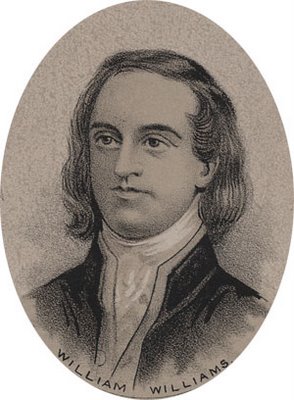The Williams family was originally from Wales. They arrived in America in 1630 and settled in Roxbury, Massachusetts.
William Williams was born in Lebanon, Connecticut, on April 8, 1731. He entered Harvard College when he was sixteen. After graduation, he returned home and studied theology.
Colonial Citizen
Williams fought in the French-Indian War in 1755 in the Battle of Lake George. Twelve hundred men were sent to observe the motions of the French and Indian army. Four miles from Lake George, they met the enemy at Rocky Brook. Although they fought with great courage, the English were overpowered and retreated. This became known as the “Bloody Morning Scout.” The English attacked later in Lake George and the French were defeated.
After the victory at Lake George, Williams returned to Lebanon. In 1756, the town of Lebanon elected Williams as the town clerk and to the general assembly of Connecticut.
Patriotic Spirit
The revolutionary spirit began in William Willams after an experience in 1755. British commanders treated the colonists harshly, with disdain and arrogance. The impression was powerful and lasting. Williams deduced that America would never see prosperity and peace as long as the British ruled the colonies. When the revolution started, Williams worked to arouse the colonists to take up arms.
Financial Sacrifices
An example of Williams’ patriotic spirit follows. In the early years of the Revolution, the country’s paper money was worthless. Members of his militia could not pay their debts. Williams exchanged more than two thousand dollars of paper money for gold and silver. Unfortunately, he never recovered his loss.
Williams settled his debts on the eve of the revolution. He was peculiarly kind to debtors impoverished by the war. Williams also forgave the debts of widows and orphans.
When the Revolution started, the patriots did not have arsenals filled with arms, munitions, or clothing. The army relied on private contributions. Selectmen from the towns of Connecticut volunteered to obtain the necessary items for the army. Not only that, they also made provisions for the families of indigent soldiers.
As one of the Selectmen of Lebanon, William Williams poured himself in asking contributions for the army from successful families. He collected more than one thousand blankets. In many instances, families made bullets from the lead weights in their clocks. Everyone made sacrifices for the cause of freedom.
Facing the Gallows
Toward the end of 1776, the Revolution was going badly for the colonies. Many feared the British would win. One evening Williams met with William Hillhouse and Benjamin Huntington. The conversation turned to the defeats their army experienced. Williams calmly replied, “Well, if they succeed, it is pretty clear what will be my fate. I have done much to prosecute the contest. I have done one thing, which the British will never pardon — I have signed the Declaration of Independence. I shall be hung.”
Hillhouse expressed his hope that America would yet be successful. He also said that he should be exempt from the gallows because he did not sign the Declaration of Independence or write any derogatory letters against the British government. To this, William Williams replied, “Then, sir, you deserve to be hanged for not having done your duty.”
Devoted Christian
William Williams was a devoted Christian. He made a profession of faith at an early age. Throughout his life, he exhibited humility and consistent Christian behavior. When Williams was a youth, the congregational church chose him as a deacon. In his senior years, he devoted himself to reading, meditation, and prayer.
William Williams died on August 2, 1811 at the age of 81.
